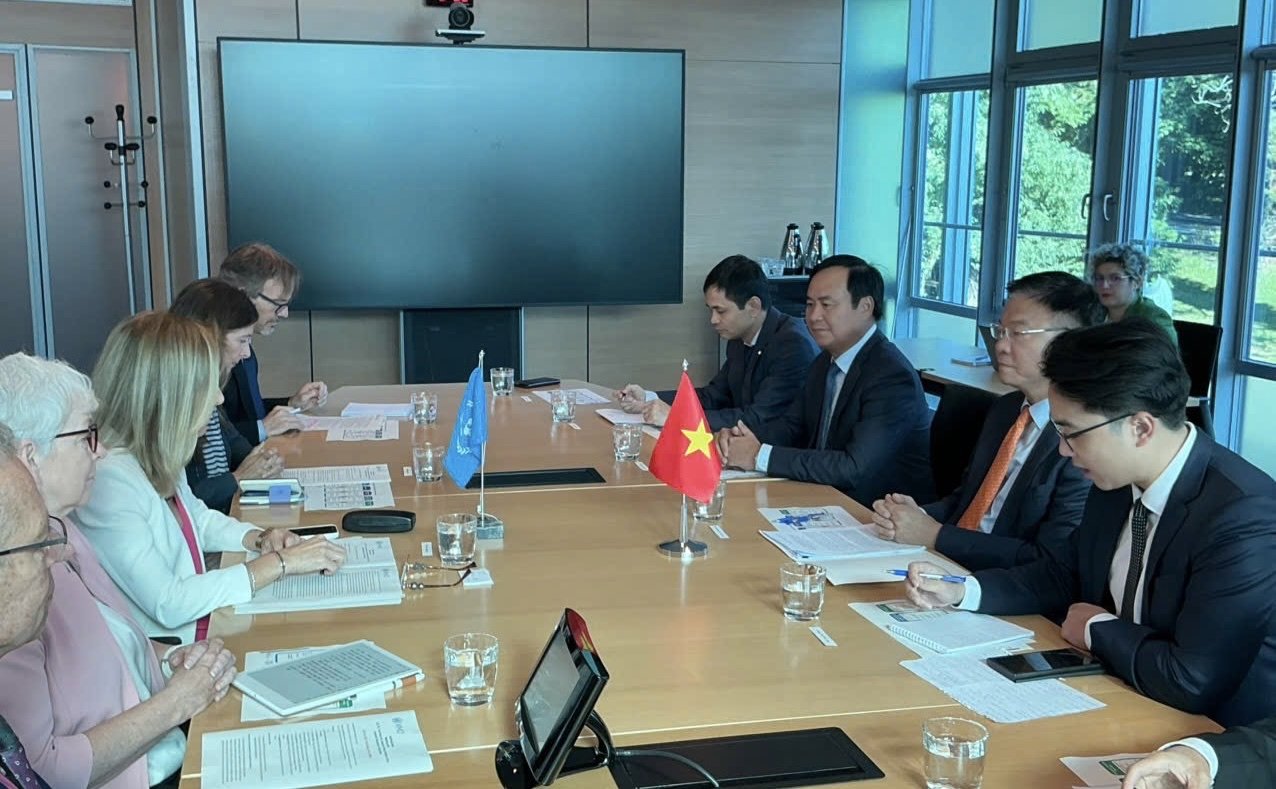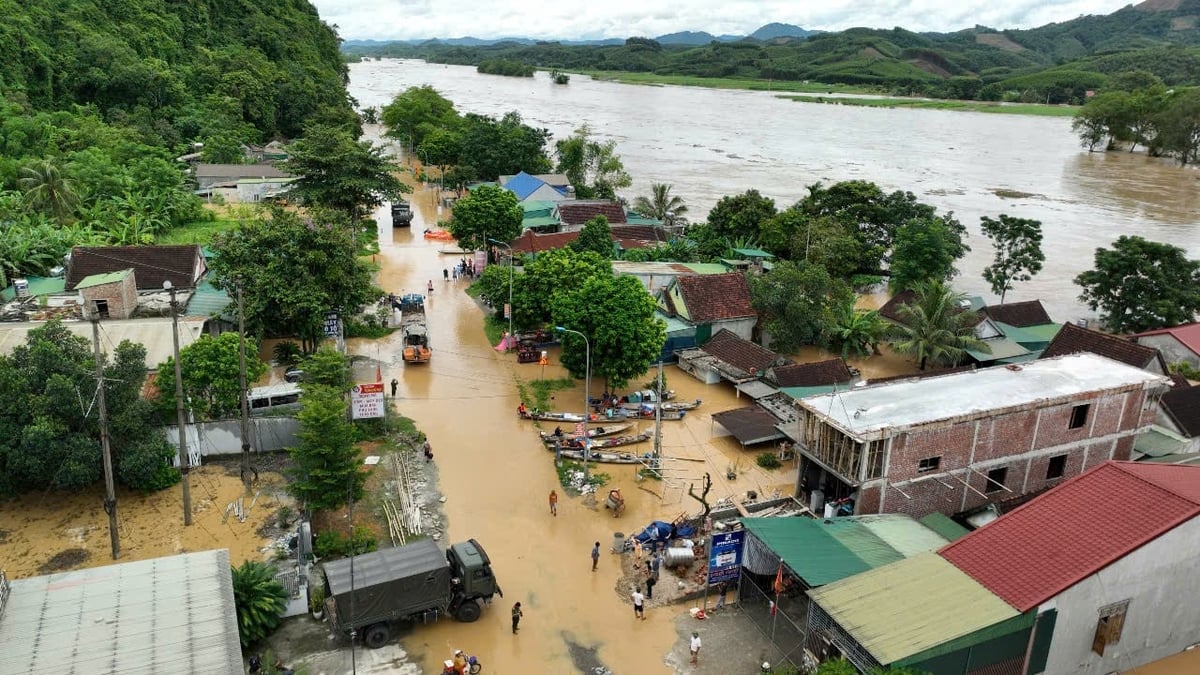November 10, 2025 | 17:52 GMT +7
November 10, 2025 | 17:52 GMT +7
Hotline: 0913.378.918
November 10, 2025 | 17:52 GMT +7
Hotline: 0913.378.918
On July 30, as part of National Assembly Chairman Tran Thanh Man’s working visit to Switzerland, Deputy Prime Minister Le Thanh Long led the Vietnamese delegation in a meeting with Ms. Celeste Saulo, Secretary-General of the World Meteorological Organization (WMO). Attending the meeting on behalf of the Ministry of Agriculture and Environment was Deputy Minister Vo Van Hung.

The meeting between the Vietnamese delegation and the World Meteorological Organization. Photo: ICD.
At the meeting, Deputy Prime Minister Le Thanh Long highly appreciated WMO's role and practical contributions in promoting global cooperation in hydrometeorology, particularly in strengthening early warning capacity and reducing disaster risks. He also expressed strong support for the “Early Warnings for All—EW4All” initiative launched by the United Nations Secretary-General and implemented worldwide.
According to the Deputy Prime Minister, technology plays a pivotal role in helping developing countries respond more effectively to the adverse impacts of climate change. Therefore, Vietnam encourages stronger promotion of the transfer of advanced technologies in weather, climate, flash flood, and landslide forecasting, especially models such as artificial intelligence (AI), numerical weather prediction (NWP), medium—and long-range forecasting, and the use of modern monitoring equipment like weather radars, automatic sensors, and satellite imagery.
“As one of the countries most severely affected by climate change, we hope that the WMO will continue to accompany and support the effective operation of the two regional centers: the Flash Flood Warning Center and the Southeast Asia Hazardous Weather Forecasting Center,” said Deputy Prime Minister Le Thanh Long. “At the same time, we call for enhanced sharing of experts and advanced technologies from member countries to strengthen disaster warning and forecasting capacity across ASEAN, particularly in the Mekong subregion.”
With its strengths in hydrometeorological training and research, Vietnam also called on the WMO to deepen and enhance cooperation in human resource development. In addition, Vietnam expressed its interest in more active participation in global initiatives such as WIGOS, GCOS, GFCS, and the Multi-Hazard Early Warning System framework.
For her part, WMO Secretary-General Celeste Saulo expressed her honor to receive Vietnam's trust and cooperation, affirming the country’s strategic position in the development of an effective and adaptive early warning system.
According to her, Vietnam not only clearly understands its vulnerability but also shows strong political will to strengthen national capacity. This proactive approach, she noted, provides a favorable foundation for WMO to partner closely with Vietnam, particularly in the areas of training and human resource development.

After Typhoon Wipha (Typhoon No. 3), Nghe An province suffered nearly 3.400 billion VND (approx. 145 million USD) in flood-related damages. Photo: Dinh Tiep.
“We have observed a common challenge among many developing countries, including Vietnam, which is the shortage of high-quality human resources in the fields of meteorology, hydrology, and climate change,” said Ms. Saulo. “To address this, WMO is implementing structured training programs at various levels to develop a well-qualified workforce capable of responding to both current and future challenges.”
“We are also ready to engage in technical cooperation with Vietnam to jointly develop a suitable roadmap for training and certification of personnel, based on actual needs, existing capacities, and Vietnam’s long-term development goals,” Ms. Celeste Saulo added.
Regarding Vietnam’s proposal to establish a regional training center, WMO Secretary-General emphasized the need to first gradually strengthen national training capacities and establish certified facilities, which would then allow for an expanded regional role. She also noted that WMO is currently working with China to develop an AI-based early warning system and stands ready to cooperate with all countries to enhance hydrometeorological capacity through technological advancement.
Ms. Saulo also praised the project titled “Enhancing climate adaptation and resilience for communities in the Mekong River Basin through strengthened meteorological, hydrological, and climate services” as a practical and high-potential initiative to improve Vietnam’s climate service capabilities. Therefore, WMO looks forward to an early response from Vietnam before proceeding with the project’s implementation.
Translated by Phuong Linh

(VAN) Numerous practical ideas, solutions, and proposals were presented at the national forum themed: ‘Rural Tourism Connected with Ecological Civilization and the Creation of a Green Living Environment.’

(VAN) TH Group is implementing multiple solutions to reduce white pollution, notably through the 'Collect Cartons - Spread Green Living' campaign and plastic reduction initiatives.

(VAN) Assoc. Prof. Dr. Nguyen Ngoc Son, a full-time National Assembly deputy serving on the Committee for Science, Technology and Environment, emphasized that agriculture and environment play a strategic role in the green era.

(VAN) Integrated management is the “key” to turning the immense potential of the sea into a driving force for national development, ensuring security, defense, and green, sustainable growth.

(VAN) Viet Nam’s hydrometeorological sector is undergoing strong innovation, aiming for modern, sustainable development and proactive disaster management.

(VAN) Viet Nam is accelerating its conservation efforts for nature and biodiversity, striving for green development, effective management, and community engagement to ensure the sustainable preservation of vital resources.

(VAN) The strengthened cooperation between two organizations, after 30 years of presence in Viet Nam, reflects a long-term commitment to a future where people and nature live in harmony.